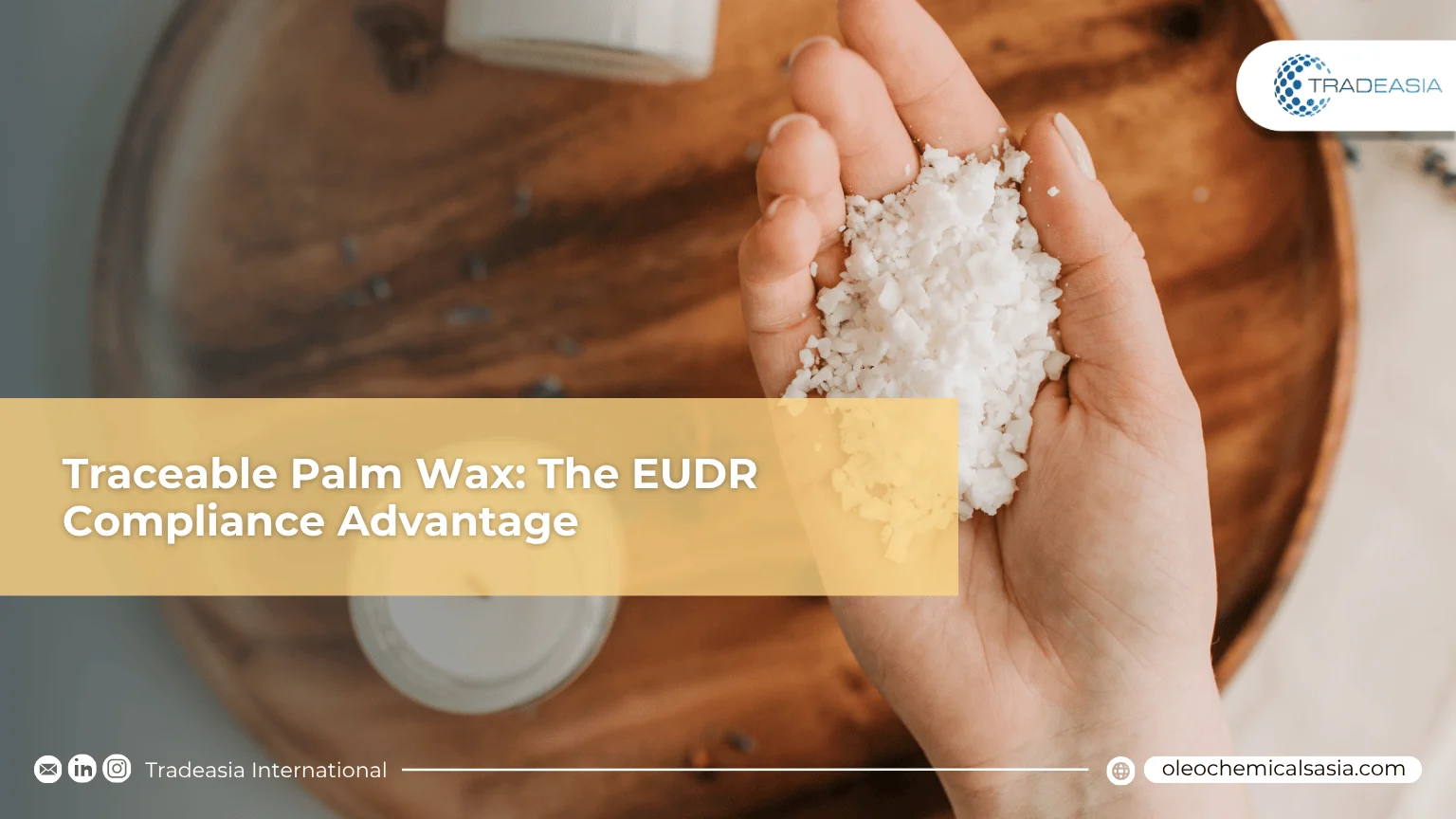Market Insight
27 October 2025
Compliance as Currency: Why Traceable Palm Wax is the EUDR Solution This October
Oleochemicals

Table of Content
- Proactive Measures Securing Market Access
- The Mandate for Certified Volume
Market Insight
27 October 2025
Oleochemicals

With the European Union Deforestation Regulation (EUDR) mandate looming large for large and medium-sized enterprises by December 30, 2025, the fourth quarter is not just about sales; it is about survival in the European market. For palm wax traders, the time for strategic due diligence is now. The integrity of the supply chain has become the new currency, and traceable palm wax is emerging as the clearest solution for navigating this complex regulatory environment. The data proves that certified sourcing directly translates to regulatory readiness.
As a specialist in palm and oleochemical trade, Tradeasia International is uniquely positioned to guide our partners through this transition. We recognize that “the foundation of lasting trade is built not on volume alone, but on the certainty of origin and the integrity of the supply chain.” This commitment to clarity helps businesses confidently procure materials. The industry is responding with a massive technological push, with regulatory compliance bodies actively reinforcing their systems. Large enterprises must fully implement EUDR by December 30, 2025, which necessitates complete traceability back to the geo-located plot of origin—a capability deeply integrated into the certified palm wax system.
The supply chain is currently providing extraordinary evidence to support compliance. The certified framework for palm oil already boasts a robust defense against deforestation, with 99% of RSPO-certified crops in key producing regions confirmed as free from deforestation. This verifiable metric, collected through satellite monitoring and geo-location data, is the cornerstone of a defensible EUDR Due Diligence Statement (DDS). This is crucial, as fines for non-compliance are severe, potentially reaching 4% of annual turnover. Beyond raw materials, this traceability extends deep into the downstream sector: the total volume of CSPO that is sold and physically traced grew by 1.1% in the last reporting period, demonstrating a tangible shift toward fully traceable physical supply for palm wax manufacturing.
The market signals underscore the urgency of securing certified volumes this quarter. The high absorption rate of certified derivatives, notably 89% of available Certified Sustainable Palm Kernel Oil (CSPKO) volume sold in the last reporting period, indicates that end-user manufacturers are already prioritizing certified inputs to prepare for the regulation. Conversely, non-certified palm wax will face rapidly diminishing market access and high volume risk. The transition to Mass Balance or Segregated Palm Wax is the most prudent strategy this quarter, allowing companies to convert regulatory pressure into a competitive edge. This move not only addresses the immediate compliance need but fundamentally de-risks the entire business model, aligning it with the explicit traceability requirements of the upcoming European legislation.
Sources:
Explore our blog and articles further to discover more valuable insights and information - Palm Chemicals (https://www.palm-chemicals.com/blog/unveiling-the-distinctions-between-refined-glycerine-and-crude-glycerine/)
Mastering EUDR compliance: Your path to deforestation-free supply chains - EurA AG (https://www.eura-ag.com/en/blog/the-eu-deforestation-regulation-eudr-new-obligations-for-companies)
ACOP 2024: Tren Pasar RSPO Tetap Tangguh Meski Menghadapi Tantangan Global (https://rspo.org/id/acop-2024-rspo-market-trends-resilient-despite-global-challenges/)
We're committed to your privacy. Tradeasia uses the information you provide to us to contact you about our relevant content, products, and services. For more information, check out our privacy policy.
Leave a Comment